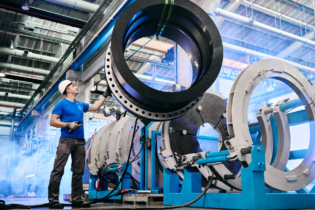PPC has cautioned against the slow pace of infrastructure development, which could result in more job and value losses for companies in the construction and feeder sectors such as cement and concrete. Njombo Lekula, PPC MD Southern Africa, stresses the need for proactive engagement and urgent implementation.
Infrastructure development has been identified as a key pillar for stimulating economic growth and job creation. However, a pandemic-induced economic depression, along with South Africa’s fiscal constraints, and a lacklustre approach to resolving the infrastructure backlog, threatens to derail the economic recovery promise. “The social and economic difficulties facing South Africa demand exceptional and accountable leadership from all sectors. We need leaders who are motivated by action rather than talk in tackling increasing joblessness and the country’s stagnant economy,” said Lekula. Lekula was speaking at the DEVAC Infrasfuture 2021 conference in Cape Town. The exclusive two-day annual conference brings together public and private sector decision-makers – including multinational executives, international investors, African governments and various other institutions – to address challenges facing the African infrastructure sector. Lekula said the industry noted with great anticipation the government’s commitment to invest in infrastructure development, including the repair and maintenance of existing assets. Stronger partnerships, pro-growth policies “Notwithstanding government’s leadership role in this aspect, government cannot do it alone. It is time to forge stronger partnerships to resolve funding challenges and other related issues that are delaying the realisation of our economic goals. It is also urgent that we have more agile and pro-growth policies and regulations that will protect our sector from the harmful effects of imports, whilst enabling accelerated growth of SMMEs,” said Lekula.The cement and concrete industry were already limping along prior to the Covid-19 pandemic due to a torpid economy, weakened construction sector and the unmitigated flood of cheap imports. The industry depends on natural resource inputs – 97% of locally-sourced inputs including limestone and ash. Cement production is capital-intensive and the industry benefits state owned enterprises (SOE) such as Transnet and Eskom in related service provisions.
Cement imports “It is vital that our policymakers and regulators appreciate the opportunity that is lost to imports. The 1 million tonnes of cement that is imported to South Africa is the equivalent of a fully integrated cement plant – such as PPC’s De Hoek factory in the Western Cape, which employs about 300 people, running at an estimated value of R900 million in annual operational spend. The bulk of that spend would cover workers’ salaries and much needed revenue to SOEs as well as many SMMEs and local service providers,” said Lekula. “We need a construction industry master plan to grow and protect the local cement industry and other elements of the value chain. We need movement on the infrastructure build and maintenance programme, and swift action in local content designation for all SOE and government infrastructure projects to sustain and create more jobs in the sector,” added Lekula. While calling on policymakers to move with speed, PPC has continued to demonstrate confidence in the country’s growth prospects by investing in SMME development, recommissioning mothballed plants and expanding healthcare access to communities in which the company operates. “We will continue to forge strong partnerships with all stakeholders and communities to improve the quality of life of all South Africans. In this regard it is imperative to explore alternative building ways, that will include and benefit communities in their housing and infrastructure building initiatives,”concluded Lekula.







